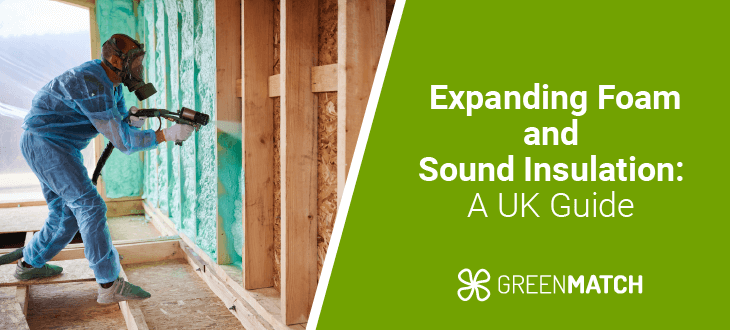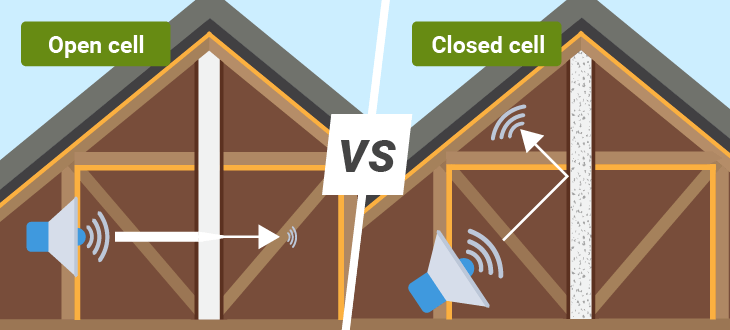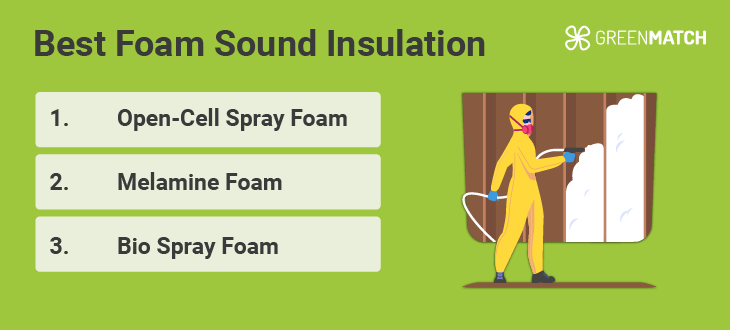Answer these simple questions and we will find you the BEST prices
Which type of solar quotes do you need?
It only takes 30 seconds
100% free with no obligation

Get Free quotes from insulation specialists near you

Save money by comparing quotes and choosing the most competitive offer

The service is 100% free and with no obligation
- GreenMatch
- Insulation
- Spray Foam Insulation
- Expanding Foam Sound Insulation
Is Expanding Foam Effective for Sound Insulation? A UK Guide

- Open-cell spray foam may provide some sound dampening due to its ability to create an airtight seal, reducing cracks and gaps that may allow noise through.
- While an airtight seal may help reduce noise, spray foam has some problems, including very little mass which may even increase the transmission of sound.
- Spray foam is usually found as polyurethane (PU) which is a pollutive and toxic synthetic, however, there are some bio alternatives such as icynene and soy foam.
Spray foam insulation is a commonly found thermal insulation method that may bring some soundproofing properties. This expanding foam is usually found in the form of polyurethane (PU) liquid. It is renowned for creating an impenetrable air barrier, which in turn helps reduce heat transfer and potentially some noise pollution.
But just how effective is spray sound insulation? Can thermal acoustic spray foam insulation provide sufficient soundproofing? All this and more is answered in this ultimate guide by GreenMatch UK. Read on for more about the pros, cons, types and applications.
Ready to soundproof your home? Look no further than GreenMatch UK for a one-stop solution for all your insulation needs. Spend just 30 seconds filling out our online form and receive up to 3 free home-tailored quotes from our network of trusted installers. No costs, no obligations. Click below to begin!
- Describe your needs
- Get free quotes
- Choose the best offer
It only takes 30 seconds



Is expanding foam good for sound insulation?
For starters, spray foam is not soundproof. This is mainly due to the very little mass and density that spray foam has, which are necessary to effectively reflect sound. Expanding foam is also very rigid when it sets, meaning it’s not porous enough to absorb airborne sound.
However, some homeowners may cite improvements to their soundproofing with spray foam insulation due to its capacity to form an airtight seal. Open-cell spray foam is specifically designed to provide some degree of acoustic insulation. It does so due to its open structure, which allows sound to enter and become trapped in the porous structure.
If you are in the market for effective heat or soundproofing, it’s best to choose thermal or acoustic insulation that is tailor-made for its purpose. This is because spray foam insulation – while providing some sound dampening – is not made for acoustic purposes.
What is acoustic foam insulation?

Acoustic foam insulation is often just another name for open-cell spray foam, a material that is inherently meant for thermal insulation, but due to its open structure can provide some degree of sound absorption. Think of open-cell spray foam like Swiss cheese. The porous holes in the material allow for sound to enter, bounce around, and lose some of its energy. That way, the sharpness of sound can be absorbed and minimised.
On the other hand, closed-cell spray foam is a much more rigid and impenetrable material that provides superior thermal insulation as spray foam insulation for walls, but little to no degree of soundproofing due to its non-porous build. Rather than provide soundproofing, such spray foam can even enhance echoes and sound by causing it to reverberate more.
Pros and cons of expanding foam sound insulation
Expanding foam sound insulation is an uncommon method of soundproofing, but it’s certainly without its advantages and disadvantages that are worth considering. Here’s a breakdown of what you could expect if you go ahead with spray foam sound insulation:
- Open-cell spray foam provides some soundproofing.
- Spray foam creates an airtight barrier that can reduce sound transfer.
- As a rigid and durable material, spray foam exhibits moisture, mould and flame resistance.
- Open-cell spray foam insulation is not inherently a soundproof material, and its effects are very minimal in comparison to its cost.
- Spray foam is often made from highly unsustainable materials that are difficult to produce, recycle or discard.
- Spray foam releases harmful volatile organic compounds (VOCs) during and after installation which can pose health and respiratory risks.
All in all, the best-case scenario is to work with a professional installer who can conduct an assessment to tailor the best approach for your needs. However, finding the right installer can sometimes take endless amounts of research, but that’s where GreenMatch UK comes in.
Instead of spending countless hours surfing websites and scheduling phone calls, just spend 30 seconds filling out our online form, and we’ll send you up to 3 free home-tailored quotes from pre-vetted installers. No charges involved. Click below to begin!
- Describe your needs
- Get free quotes
- Choose the best offer
It only takes 30 seconds



Best expanding foam sound insulation types

Ultimately, there is no single best-expanding foam for noise insulation, because expanding foam is not usually made for soundproofing. However, some best bets are likely to give you the most desired results. Here’s a summary of your options on the market:
- Open-cell foam: This type of expanding spray foam provides the best possible sound insulation that spray foam can. The Swiss cheese-like porous material allows for sound to enter and lose energy, thus dampening some degree of noise with success while providing decent thermal insulation.
- Melamine foam: While it’s not an expanding foam, melamine-based foam panels are premium grade, lightweight and porous sheets that provide effective soundproofing due to its unique surface structure that makes it a popular acoustic material for recording studios and music venues.
- Bio spray foams: Ultimately, if spray foam is the way to go, it’s recommended to also consider some of the available eco-friendly options. Icynene is a castor oil-based expanding foam that can also be open-cell, providing some degree of sound absorption. The same goes for soy foam, derived from soybean as the name suggests.
A DIY installation may be tempting, but it’s best to remember that shabby insulation can incur higher repair costs than your initial investment. For this reason, it is recommended to consult with a professional installer to tailor the best approach to your home's needs.
Is spray sound insulation a good option for you?
Ultimately, spray sound insulation is not the best option if you are looking for effective noise-proofing for your home. There are rather much better options that are more affordable, sustainable and effective to consider. Some examples are acoustic mineral wool, cotton, and even corkboards.
However, making the right decision can seem overwhelming without guidance. It’s recommended to hire a professional installer to assess your property and tailor the best course of action for your needs. Finding the right installer? That’s no easy task either, until GreenMatch UK.
Instead of spending countless hours of your life surfing the web and scheduling phone calls, leave it up to us. Spend just 30 seconds filling out our online form, and we’ll send you up to 3 free home-tailored quotes from our network of pre-vetted professionals. No costs or obligations apply. Simply click below to begin!
- Describe your needs
- Get free quotes
- Choose the best offer
It only takes 30 seconds



FAQ
Spray foam insulation is not inherently a good soundproofing material. For the best results, working with open-cell spray foam can provide some degree of sound insulation, but it’s best recommended to work with materials tailor-made for acoustic purposes.
Foam filler is not inherently soundproof, but by providing an airtight seal, foam filler may reduce some sound transfer by sealing off cracks and gaps from which sound can travel.
The best foam for soundproofing is likely melamine foam. While it’s not an expanding spray foam, these premium-grade foam panels have a cleverly designed surface that successfully absorbs airborne sound, making it ideal for music halls and recording studios.
We strive to connect our customers with the right product and supplier. Would you like to be part of GreenMatch?

